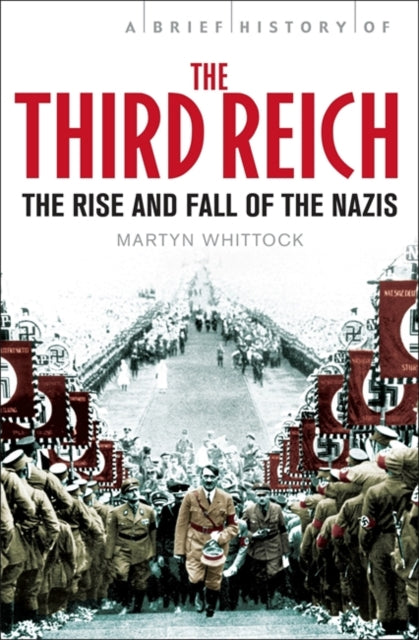A Brief History of The Third Reich : The Rise and Fall of the Nazis
Usually shipped within 24 hours
UK deliveries from £5.95
Delivery & Returns
Delivery & Returns
We use the Royal Mail, DHL Express or UPS for our customers. For UK addresses, deliveries under 10kg are a standard £4.95 via Royal Mail Tracked 48 Service. For orders over 10kg and overseas customers, postage is calculated for you at checkout once you have entered your postal address. This price, does not include any potential custom charges that may apply, depending on the product or destination, as every country has very different import duties / taxes. Online exclusive products (such as trainers) will be delivered to you directly from the printer, separate from other items in your order, but your postage fee covers ALL items in your order.
If you are unhappy with your purchase, please email shop@tankmuseum.org within fourteen (14) working days of receiving your goods, and return it to us at the address below, in its original condition, unopened (with any seals and shrink-wrap intact) and we will issue you a full refund or replace it. Goods must be returned at your own cost. If the item is faulty, you do not need to return it, we will send you a replacement free of charge.
Description
Description
By Martyn Whittock
The abuse of power, genocide, the destruction of total war, unimaginable cruelty and the suffering of millions were all central features of Hitler's Nazi regime. Yet the Nazis were also highly successful in manipulating images and information: they mobilized and engaged vast numbers of people, caught the imagination of the young and appeared remarkably modern to many contemporary observers.
Was the Third Reich a throwback to a mythical past or a brutally modern and technologically advanced state?
Was Hitler a strong dictator who achieved his clear goals, or was his chaotic style of government symptomatic of a weak dictator, unable to control the complex and contradictory forces that he had unleashed?
Was the Third Reich ruled by terror, or largely supported by a compliant German population?
Was the genocide against the Jews a peculiarly German phenomenon, or a uniquely German expression of a terrible wider trend? Whittock explores these and other key questions, interrogating the views of different historians and drawing on a wealth of primary sources - from state-sponsored art to diaries, letters and memoirs of both perpetrators and victims - to provide an overview of the complex evidence.
History should aim to put us firmly in touch with the lives of people living in the past and the issues they faced. Whittock never loses sight of the individuals whose lives were caught up in these extraordinary events, while also giving a lucid overview of the bigger picture.
![A Brief History of The Third Reich : The Rise and Fall of the Nazis Book [variant_option4]](http://tankmuseumshop.org/cdn/shop/products/9781849012997.jpg?v=1748334804&width=1214)

![A Brief History of The Third Reich : The Rise and Fall of the Nazis Book [variant_option4]](http://tankmuseumshop.org/cdn/shop/products/9781849012997.jpg?v=1748334804&width=88)
![Christmas Tank Museum Wrapping Paper - Two sheet pack Wrapping Paper [variant_option4]](http://tankmuseumshop.org/cdn/shop/files/DSC2318.jpg?v=1759225755&width=176)
![A Brief History of The Third Reich : The Rise and Fall of the Nazis Book [variant_option4]](http://tankmuseumshop.org/cdn/shop/products/9781849012997.jpg?v=1748334804&width=640)



